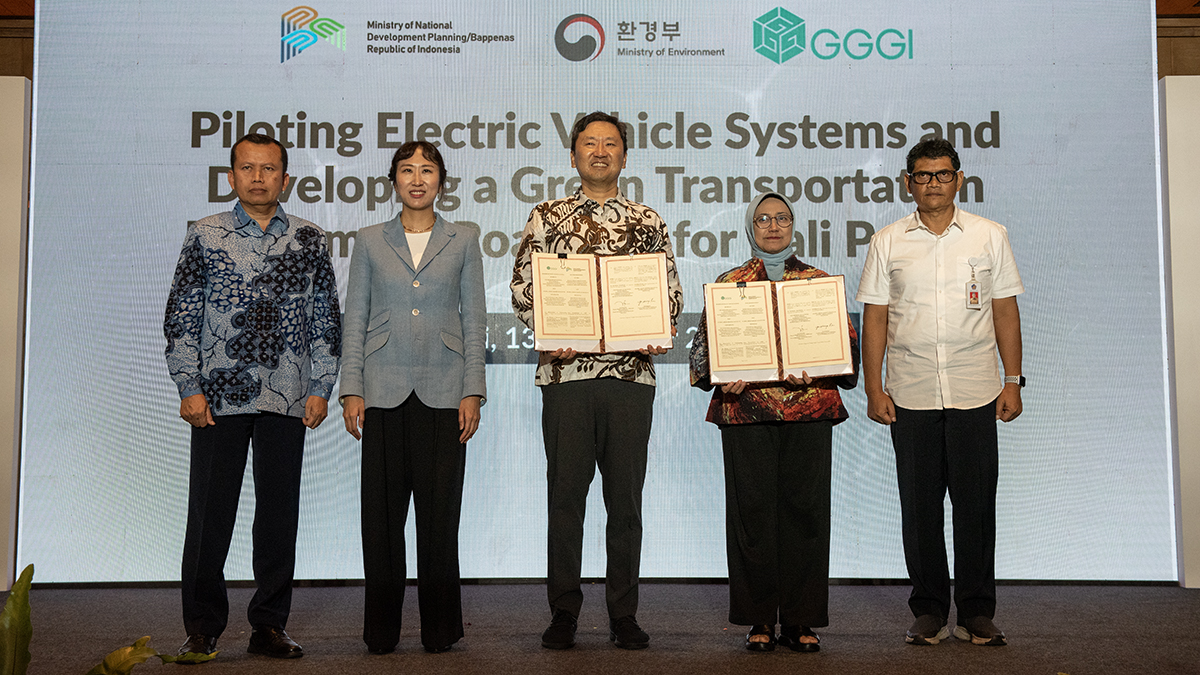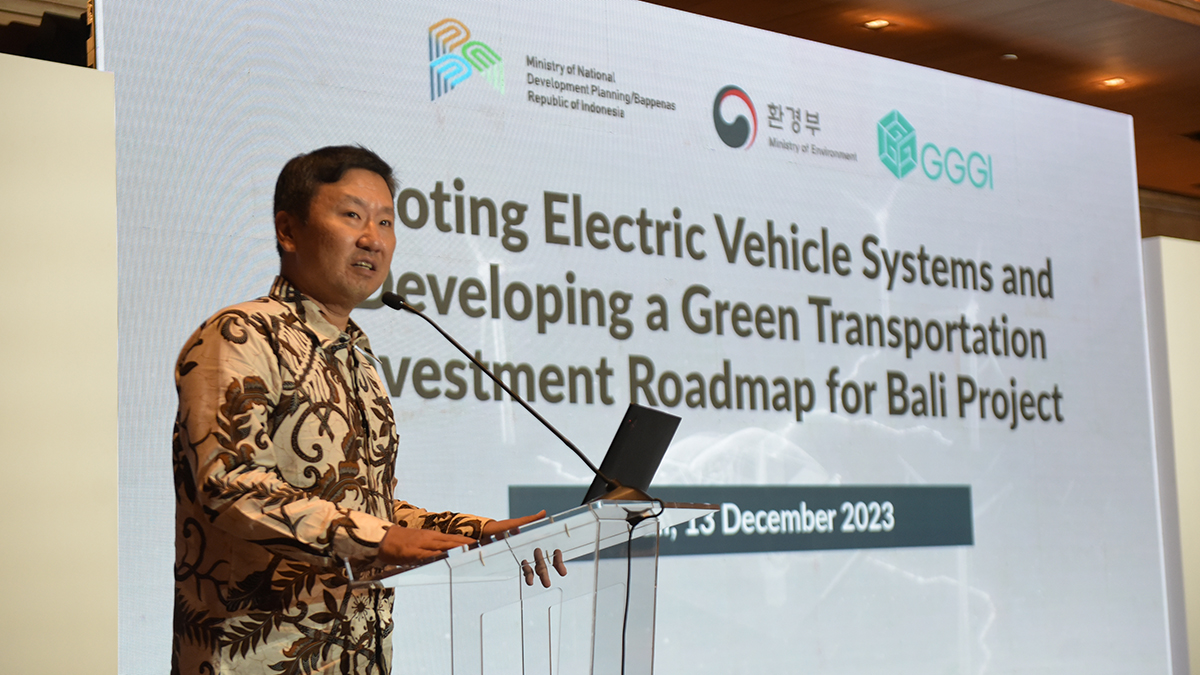What do ‘Paradigm Shift’ and ‘Climate Rationale’ Mean for the Green Climate Fund (GCF) Project Concept Notes
Over the past 6 months, the Global Green Growth Institute (GGGI) and the Fiscal Policy Agency, Ministry of Finance Republic of Indonesia as the National Designated Authority (NDA) Green Climate Fund (GCF) Indonesia has been working with E Co. to build the capacity of shortlisted project proponents from the inaugural NDA Call for Project Concept Notes in developing concept notes for the Green Climate Fund (GCF). As part of the capacity building process, representatives from civil society organisations, local government, and the private sector have received in person training and remote coaching support.
Insight into the Call for Project Concept Notes capacity building process
The training programme is divided into two main parts:
- In person training in Indonesia
E Co. delivered two trainings in Indonesia, in October of 2019 and January 2020. Each training covered a number of topics, including, the GCF investment criteria; problem and solution trees; the climate rationale; theory of change; logframes; project finance and budgets; and co-financing requirements. Details about the October training can be read here.
- Remote coaching for concept note developers
After the in-person training in January, the programme continued with remote coaching support phase. This includes written feedback on concept notes, a webinar series and access to an online course on gender. By the end of the capacity building, E Co. will have provided three rounds of feedback on 25 concept notes. The webinar series prioritised topics based on feedback from the participants and GGGI, and observations from the concept note reviews. These topics included co-financing, environmental and social standards, paradigm shift, climate rationale. The gender course consisted of two modules (Module 1: Gender in GCF concept notes and Module 2: Gender mainstreaming) and was made available to participants via E Co. Institute.
Focus on climate rationale and paradigm shift
The final webinar of the remote coaching support covered the topics of climate rationale and paradigm shift for both mitigation and adaptation projects. These topics often present a challenge to project developers and generate a great deal of discussion in training sessions.
Climate rationale is a term used to describe the scientific basis of a concept note. Ultimately, this section at the start of the concept note should set the foundation to build the rest of the project on. A climate rationale will describe the climate change scenario, outlining the climate problem in one particular country (e.g. flooding, droughts for an adaptation project) and region that the project will be implemented in. The climate rationale needs to be streamlined throughout the concept notes. For example, barriers should be those relevant to addressing the climate problem and the activities should be addressing those barriers.
Grasping the concept of paradigm shift prior to executing the details of your project design can be very beneficial when planning your project. It is one of the 6 investment criteria of the GCF. The GCF definition is “the degree to which the proposed activity can catalyse impact beyond a one-off investment and results in medium to long term change”. The GCF wants to see projects that are designed in a way that the project won’t just be a one-off investment, but rather will catalyse broader sectoral change. So, what does that mean when writing a concept note? Taking an example from the webinar, a project on developing geothermal energy (a GCF project currently being implemented in Indonesia) should build local capacity and train people within the country to be able operate and maintain the technology throughout the lifetime of the technology – as opposed to importing expertise.
Special guest in the webinar, Pierre Telep from the GCF
Pierre Telep, from the GCF, joined as a guest speaker at E Co.’s final webinar. Pierre is a Renewable Energy Expert from the GCF. He spoke on the paradigm shift, mentioning that it is indeed a “very complex” term. Pierre explained how, along with the rest of the 6 investment criteria (see image above), the paradigm shift is ranked by GCF’s ITAP (Independent Technical Advisory Panel) as being ‘high, medium, or low’. He then explained the key elements of paradigm shift that defines ‘impact’ He shed light on issues relating to challenges differentiating between (3) and (4), where (3) focuses on ensuring the project activities should create a strong market environment and create opportunities for the private sector to invest in e.g. mitigation technologies. (4) focuses on ensuring that the project will contribute to changes in laws and regulation so that the country can continue moving forward to address climate change.
Pierre emphasised that the GCF is accountable in ensuring that the public funds are used to create impact. This means that they must invest in projects will result in transformational change and will have a significant impact in terms of reducing emissions and building resilience that will extend far beyond the lifetime of the project. This is why paradigm shift should be mainstreamed throughout a project concept.
Closing
Capacity building process such as this one offers an opportunity to accelerate climate action by ensuring that project developers around the world have the right tools and know-how to be able to secure funding for their project. In turn, they are able make an impact in their countries and local communities.
The capacity building helps addressing barriers to access climate finance, such as Understanding and designing a climate change project that fulfils GCF’s criteria, addresses and responds to GCFs concepts and theories. These are particularly challenging for local actors to overcome.,
To date, majority of the organisations that access GCF funds are large international institutions, such as international financial institutions or United Nations organisations. Direct access entities, or national-level entities (such as national NGOs) are unfortunately being left behind. Many of these entities lack the funding and capacity they need to develop a concept note or full funding proposal for the GCF. Bringing direct access entities to the table means greater country ownership, a key principle that the GCF strives for. The Fiscal Policy Agency as the NDA GCF Indonesia will continuously build the capacity of national and local actors in climate projects to support the emissions reduction target as well as increasing communities’ resilience.




